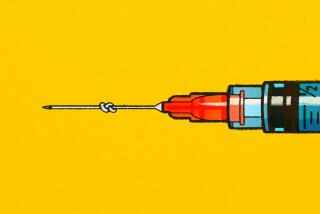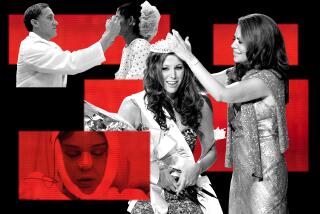West case highlights risks of cosmetic surgery
Medical experts say cosmetic surgery should be performed only on relatively healthy people.
But Donda West, the 58-year-old mother of rapper Kanye West, had a number of serious health issues, including high blood pressure, high blood sugar and cardiac artery blockage, according to an autopsy report released this week. Still, a Brentwood plastic surgeon approved her for extensive cosmetic surgery last year.
She died Nov. 10, a day after undergoing the 5 1/2 -hour operation, and the circumstances of West’s death underscore a point that has become a worry of experts on plastic surgery.
As the number of cosmetic surgeries increases rapidly, experts said, they are struggling to educate patients and doctors that the operations carry the same significant risks as any other kind of surgery and should require thorough preoperative screening.
“I think American consumers have been treating plastic surgery like a commodity,” said Dr. Rod Rohrich, chairman of plastic surgery at the University of Texas Southwestern Medical Center in Dallas. “It’s not like going to find a pair of shoes. You can take the shoes back. You can’t bring your life back.”
Rohrich recalled one patient who was insistent about getting a face-lift even though she also needed a heart transplant.
“Bottom line, cosmetic surgery is only for patients that are healthy,” Rohrich said. “If they’re not healthy, it’s really not usually a good thing to do.”
But more prospective patients are increasingly demanding such cosmetic procedures even if they are not fit for them, he said.
“It’s the aging of the baby boomers . . . and it’s the popularity of plastic surgery because of the ‘Extreme Makeover’ phenomenon,” Rohrich said, referring to the ABC TV show about cosmetic surgery. “That’s why you have to be even more careful than you were years ago” screening prospective patients.
Nearly 11 million cosmetic procedures were performed in 2006, up 48% since 2000, according to the American Society of Plastic Surgeons.
The most popular procedure in 2006 was Botox injections. The most popular cosmetic surgical procedures were breast augmentation, followed by nose reshaping and liposuction.
A major reason cosmetic surgery has soared in popularity in recent years is because of intense media focus on celebrities’ operations, as well as the development of reality TV shows such as “Extreme Makeover,” Rohrich and others said.
A study published in the July issue of the journal Plastic and Reconstructive Surgery said reality TV shows directly influence first-time patients who decide to have cosmetic surgery. The study surveyed 42 first-time patients at the Yale School of Medicine.
Most of the TV shows have happy endings -- with patients receiving successful surgery.
The reality is somewhat different -- in some cases with multiple operations, and long and sometimes painful recovery periods that are not depicted in the TV shows.
A 2004 study published in Plastic and Reconstructive Surgery of procedures performed in office-based surgical facilities found that serious complications occurred in 1 out of 298 cases, and deaths occurred in 1 out of 51,459 cases.
“A surgical procedure is really an assault on the body,” an assault better handled by healthier people, Rohrich said.
West, who was 5 feet 2 and weighed 188 pounds, underwent significant liposuction, a partial reduction of her right breast and implants in both breasts.
In the same operation, she underwent a “belt lipectomy,” which excises fat all around the belt area and tightens the surrounding skin.
She also had her muscles tightened in her abdomen.
“We’re not talking about removing a mole. This is a pretty big surgery,” said Dr. Michael F. McGuire, vice president of the American Society of Plastic Surgeons and an associate clinical professor at UCLA, who reviewed the autopsy report for The Times.
“The stress of surgery and the stress of the recovery with the associated pain can exacerbate an underlying coronary condition, and that could have been the terminal event,” McGuire said.
The Los Angeles County coroner’s office did not determine a precise cause of death, but said West “died from some preexisting coronary artery disease and multiple postoperative factors following surgery.”
There was no evidence that the death was caused by a mistake in surgery or anesthesia.
Details have not been disclosed as to the screening West underwent to determine preexisting conditions before her Nov. 9 operation at a Brentwood facility.
West had approached a different plastic surgeon in Beverly Hills months earlier, but that doctor has said he never performed the procedure because of a preexisting condition that could have resulted in a heart attack.
“As we may have seen with this tragedy with Mrs. West, this should be a lesson. When you’re turned away, there’s good reason,” said Dr. Richard A. D’Amico, president of the American Society of Plastic Surgeons and assistant clinical professor of plastic surgery at Mt. Sinai Medical Center School of Medicine in New York City.
The Beverly Hills doctor who turned West down is certified by the American Board of Plastic Surgery, which means he went through five to seven years of specialized training and passed an oral and written test.
Dr. Jan Adams, the surgeon who ultimately performed the operation on West in Brentwood, is not certified by the Philadelphia-based board.
Adams has appeared on such TV shows as “Oprah” and “Extra” and has hosted his own plastic surgery show.
Last year, the Medical Board of California sought to suspend or revoke Adams’ medical license because of multiple alcohol-related arrests.
Adams has strongly denied any wrongdoing. And the administrator of the Brentwood clinic where Adams operated characterized the coroner’s findings as a vindication for Adams because it concluded that there was no evidence that the death was caused by surgical error.
Plastic surgery is a highly lucrative field -- one that attracts doctors with limited experience in that specialty. Some doctors with training in unrelated fields have taken “weekend courses” in liposuction or other procedures, McGuire said.
Under state law, anyone with a California medical license can practice any kind of specialty, even without board certification. Because plastic surgery is mostly done outside of hospitals, patients might not realize they are being cared for by a doctor with little formal training.
Some doctors advertising plastic surgery also mislead patients, saying they are “board certified” without specifying that the certification is in another specialty, McGuire said. Or, they claim certification by a board other than the American Board of Plastic Surgery, McGuire said.
“There are a lot of people attempting to do plastic surgery that are not trained,” McGuire said.
--
(BEGIN TEXT OF INFOBOX)
Selecting a surgeon
There are three recommended ways to verify if a plastic surgeon is well trained:
1. Go to www.abplsurg.org, the website of the American Board of Plastic Surgery, to find out if a doctor is certified as a plastic surgeon.
2. Ask the surgeon if the operation will be performed at an accredited surgery center. Then, contact the accrediting organization to verify the center’s status. A list can be found here: medbd.ca.gov/
outpatient_surgery.html
3. Make sure you undergo a thorough consultation and preoperative evaluation, which usually includes a thorough history, physical exam and lab tests.
Source: Times reports
More to Read
Sign up for Essential California
The most important California stories and recommendations in your inbox every morning.
You may occasionally receive promotional content from the Los Angeles Times.











